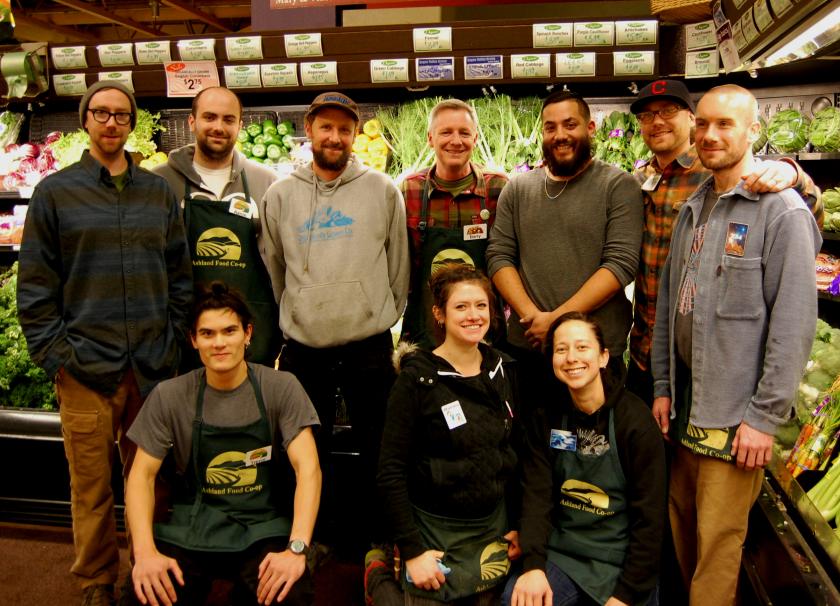
Behind the Scenes: Produce Department
You shop for groceries at the Co-op. For lunch, you often stop at the Deli for a quick meal from the Hot Bar. You meet friends outside on the plaza, give each other long hugs, and catch up on life. After a long week, you swing by for the Friday beer and wine tastings at the Kiosk. But how well do you really know the Co-op?
Well, we’d like to tell you more about us and all the magic that happens behind the scenes. Welcome to our new blog series appropriately named… Behind the Scenes! Clever, right? Over the next few months, we’ll share facts, tidbits, and product picks from each department.
The Ashland Food Co-op Produce Department is arguably the most vibrant part of the store. Rows of green kale, colorful chard, red-golden apples, and perfectly yellow bananas greet you as soon as you enter. It’s a radiant fruit and vegetable oasis.
But this oasis is a lot of hard work. From beautiful displays, early morning deliveries, to ensuring the organic integrity of each product, the AFC Produce Department works hard day in and day out.
Did you know?
- In one local growing season the Produce Department purchases produce directly from over 30 local organic farmers.
- The primary source of produce throughout the year is Organically Grown Company, an employee and farmer owned Produce distributor based in Eugene. In 2014, OGC delivered over 87,000 cases of produce to our Co-op in “Clean Air” certified, biodiesel delivery trucks.
- For 9 months of the year the AFC Produce Department sells 3lb bags of Farm to School Fuji apples and donates 100% of the profits to Rogue Valley Farm to School. Since the program’s beginning in 2011, the Co-op has donated $30,613.44 to Rogue Valley Farm to School.
- At the Co-op, we choose to sell G.R.O.W. Bananas. G.R.O.W is an acronym for “Giving Resources and Opportunities to Workers” which is a type of Fair Trade program that provides dental and vision care as well as educational support and funding for less fortunate families in the communities where the bananas are grown. In the last year, we have sold 225,284 lbs of G.R.O.W. bananas which translates to over $3,000.00 in donations for those families in need.
There are few produce experts out there like Rachel Chastain. She has worked at the Co-op for 14 years, ten of those in Produce, and the last three as Assistant Manager. Rachel has a passion for fresh, quality products and helping YOU, the customer, learn more about the fruits and vegetables in your cart. She kindly answered a few questions for me.
We are Southern Oregon’s only Certified Organic Retailer, but what does this mean?
It means that the entire staff here at the store has been trained to uphold the organic standards set forth by the USDA and Oregon TILTH. When you buy organic produce here at the coop, it is the real deal!
The training ensures that cross contamination from conventional products does not happen throughout the receiving, storing or stocking process. Each year we are inspected to make sure we have all the current certifications for our growers and producers to ensure that their products continue to be organic from year to year.
Most stores carrying organic produce do not stay current with their certifications. Our certifications and inspections keep us accountable and let our shoppers know that they are truly getting the certified organic food they came to the Co-op for.
Any cool produce tips you can let us in on?
Ever wanted to know how to get your avocado ripe faster? Well, here is how. Take your avocado and put into a paper bag with a banana or three. Bananas give off lots of natural ripening gasses called Ethylene gas. When you trap the gasses around a fruit you want to ripen it helps it along.
If you could only eat one item from the Co-op for the rest of your life, what would it be and why?
My one thing would be apples. I just love the multitude of textures, colors and flavors that apples have to offer.
If you were stranded on a desert island and could only take 3 items from the Produce department with you, what would they be and why?
I would bring all the wonderful people I see every day at the Co-op to keep me company. Avocados, for their delicious flavor and amazingly sustaining, nutrient rich make up. Coconuts, because who wants to be on a desert island without a good coconut?
What’s your favorite part about your job?
I love produce! It's all about the live organic foods and the wonderful and amazing people that I get to chat with every day.
Rachel’s right. Who doesn’t love fresh, organic fruits and vegetables? I know I do. But sometimes, the world of produce can be hard to navigate. For example, what is a persimmon and how do I eat it? And celeriac, how do I even cook that? Well never fear, our knowledgeable staff is here. When in doubt, just ask. They are always eager to help and share their knowledge.
Staff Pick from Geoffrey Stewart
Kolo Kai Farms White/Yellow Ginger and Turmeric
Grown and packed on the island of Kauai, Kolo Kai Farms are producing some of the biggest, juiciest ginger and turmeric available. Our orders are harvested and shipped within 24 hours directly to the Co-op. Kolo Kai begins their season with White Ginger, a less spicy but full flavored variety that does not store as long as its yellow counterpart. Turmeric follows close behind and is shipped through the winter months.
Staff Pick from Mahlea Rasmussen
Watermelon Daikon Radish
The watermelon daikon radish is one of my favorite items in produce. Unopened it closely resembles a turnip, but sliced a vibrant almost neon center is revealed. It has a light flavor and lovely crunch, making it a great addition to any salad. I think it goes great with arugula, chevre cheese and blood oranges. I like to slice open, and carefully peel around the flat end in a circular motion. This makes ribbons I can easily shape in to little watermelon radish flowers, which can be used as a garnish.
That’s a wrap on the Produce Department. Next up, we’ll dive deep into the world of meatloaf, breakfast burritos, and smoothies.
More Co-op News
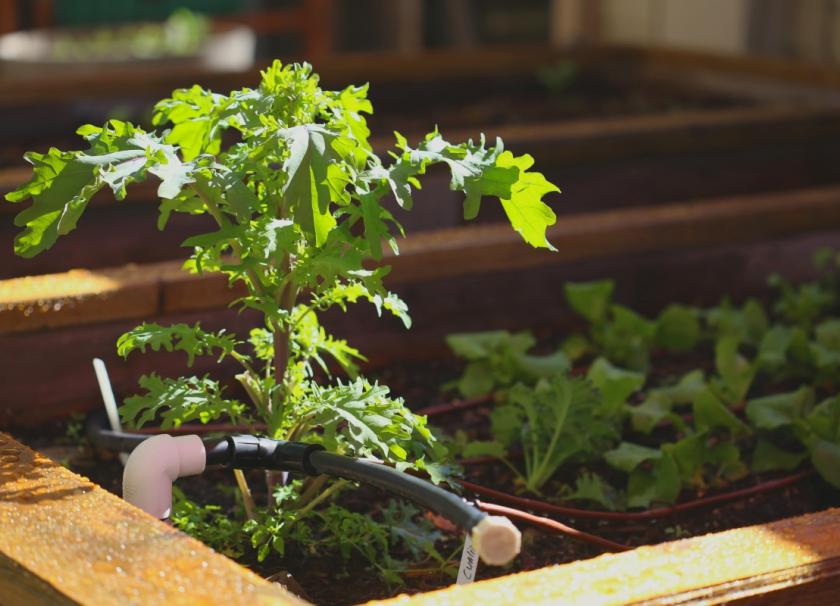
Henry in the Garden: Already Preparing for the Spring
The bane of all gardeners is powdery mildew - that white substance that collects both on the tops and bottoms of the leaves of your healthiest vegetable plants. Cucumbers and zucchini seem to be more easily affected by this scourge than many others.

GM Report: Gratitude for a Great 2019 at the Co-op
It’s the season of gratitude and reflection on the year that has passed, and there is so much to be thankful for as a Co-op owner.
2019 started off with the news that over $13,000 in emergency donations had been raised from Co-op owners and shoppers for support and relief efforts after Paradise, CA was leveled by a wildfire. This outpouring of our support was critical in the months after the fire, after the news trucks had left and the work of rebuilding began. I know how grateful we all are for the much calmer smoke season that our region experienced this summer.
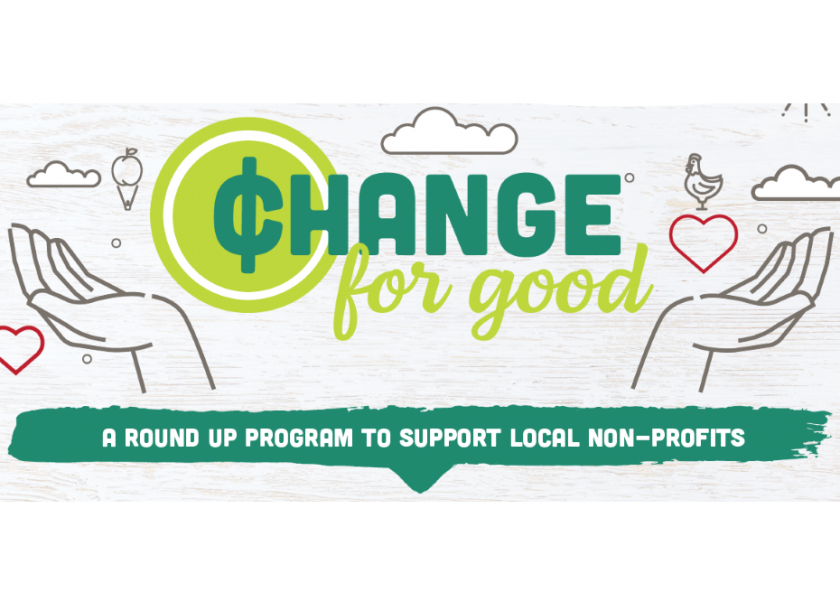
Rounding Up in October
Part of what makes co-ops unique are the guiding 7 Principles of Cooperation. One of the seven that is felt strongly in Ashland is "Concern for the community" - and that's why the Co-op is offering a new way to give back to our community for the month of October. When you pay at the register, you can round up your total to the nearest dollar. For example, $11.68 becomes $12, and $0.32 is donated.

Win 2 tickets to "Chicken Done Simply" cooking class
Find out how fun and educational Co-op cooking classes are! Sign up below for the chance to win two free seats (for you and a friend or loved one) at the next class, "Chicken Done Simply" with the Co-op's own Michelle Guerrie.
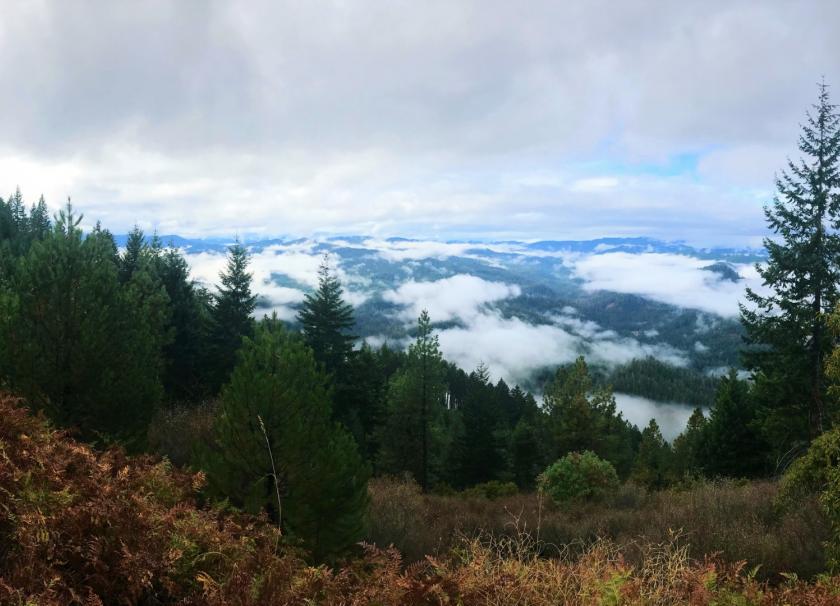
Fall Staff Picks
Thanks to alpine trails and shaded valley creeks, outdoor recreation is year-round in the Rogue Valley. But fall usually makes for more frisky feet, so we asked Co-op employees for their favorite fall activities and recommendations for what they grab before they head out.
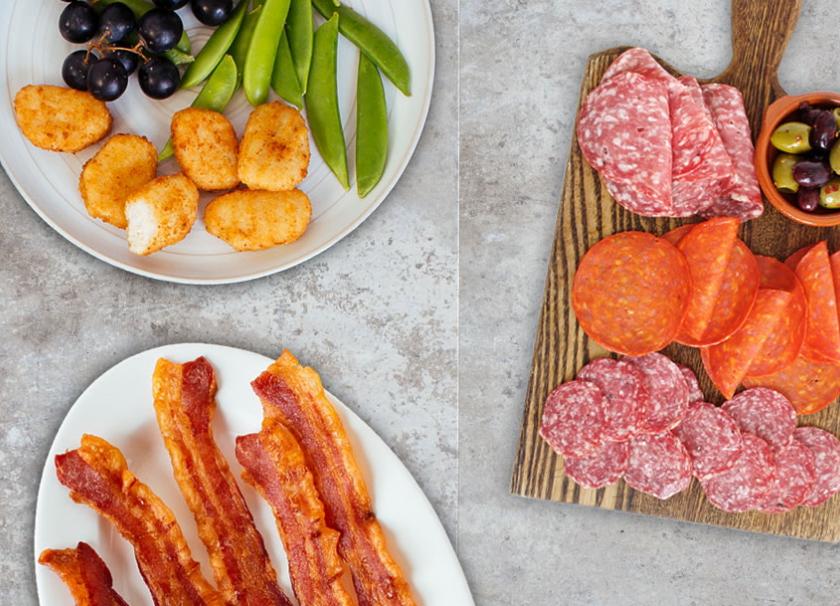
Applegate products joining Co-op Basics
Just in time for the school year, Applegate products are being added to the Co-op Basics program! The Co-op carries a variety of Applegate products, like sliced deli meat, cheeses, bacon, and sausages. Now as part of the Co-op Basics program, you’ll be saving up to $2 on Applegate products across the store, every day.

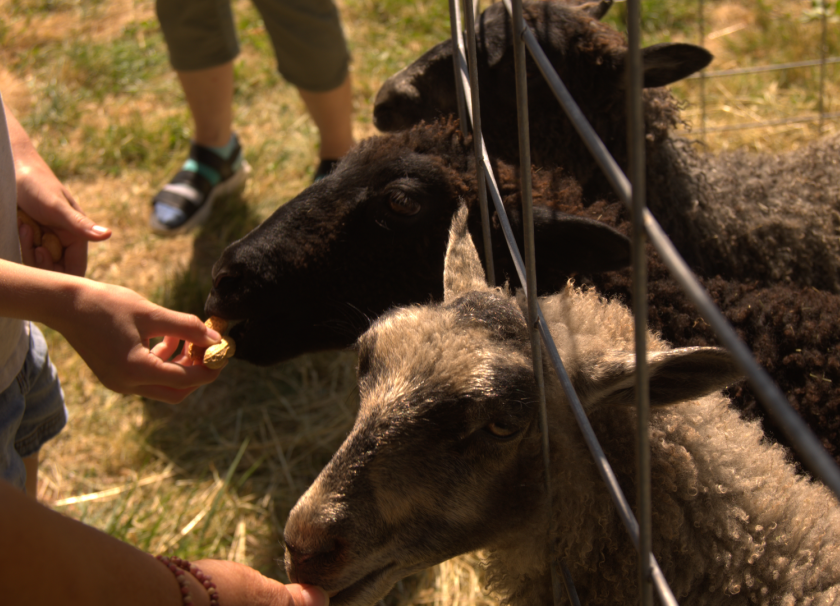
2019 Farm Tour Recap
Another successful farm tour is in the books! With 30 farms this year, visitors could see how bigger farms work, like Herb Pharm, Fry Family Farm, and Rogue Creamery, while also experiencing the joys of smaller farms, such as Turning Point Farm, Fox Run Farm, and Daily Blessing Farm.
Visitors of all ages enjoying Goodwin Creek Gardens
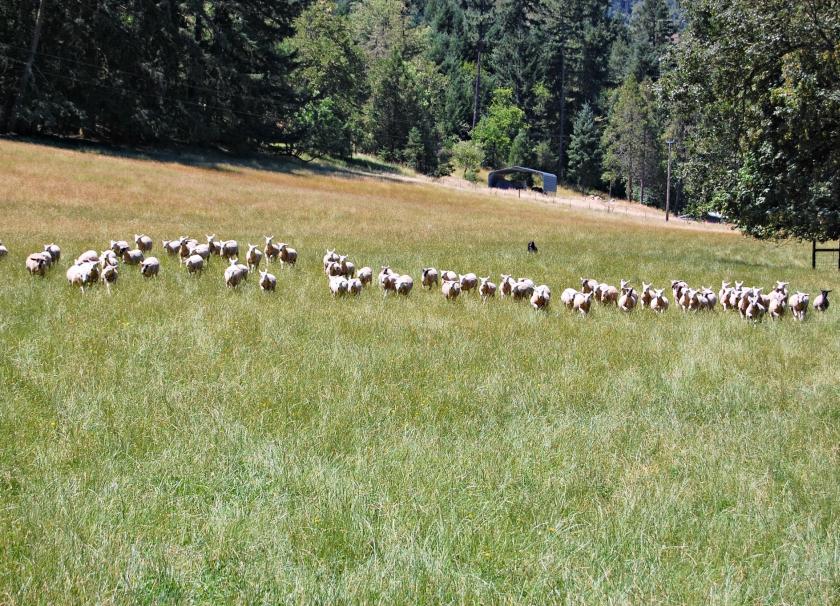
AFC Celebrates 20 Years with Magnolia Farms
This year, the Ashland Food Co-op proudly celebrates their 20 year partnership with Magnolia Farms. Their pasture raised, no antibiotics, no hormones lamb is a staple in the Co-op Meat Department. Magnolia Farms is graciously donating the lamb for our August First Friday in celebration of our long standing partnership.
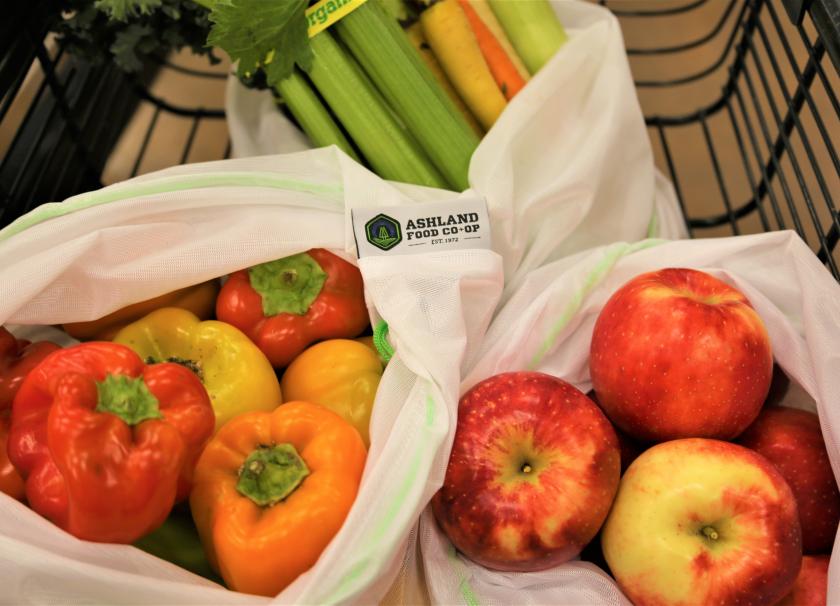
Compostable Bags
The Co-op has been asked if compostable plastic bags are a viable alternative to the standard plastic bags offered in the produce and meat departments.
For several reasons, compostable bags are not in line with the Co-op’s goals and standards.
Not compostable at home
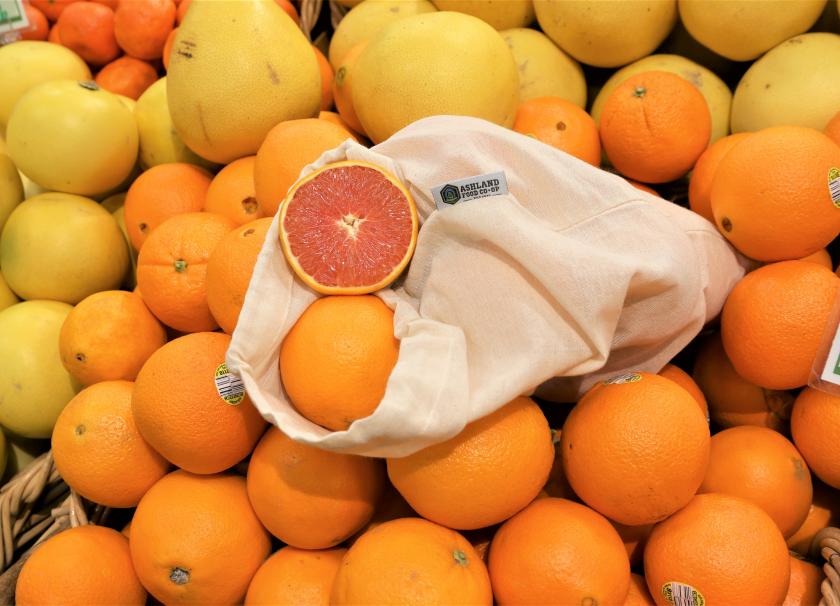
Sustainability Update: Energy efficiency and zero waste
Energy Efficiency
We are happy to announce that we are a member of the Energy Trust of Oregon’s Strategic Energy Management program. This is a free program available to customers of Avista and Pacific Power, which offers awesome incentives including a paid internship!
Community Grant Recipients 2019
The Ashland Food Co-op donated over $29,000 to 28 local nonprofit organizations through their Community Grant Program.
The Community Grant program is the focus of one of the fundamental Cooperative Principles, which all cooperative enterprises follow. Our Community Grant Program supports Principle 7, Concern for Community.
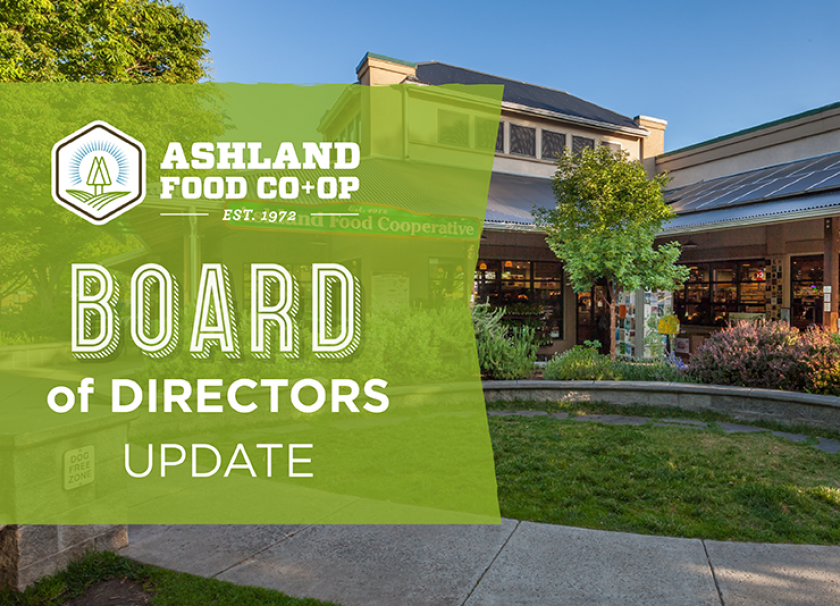
Meet the 2019 Board of Directors
Congratulations to Annie Hoy, Melina Barker, Lisa Beam, and Steve Bowman for their election to the Board of Directors! We were delighted to have such a strong slate of candidates to fill our four vacancies. You can read more about each new director here.

How to stay sustainable with paper products
Have you thought about how sustainable your paper home products are? While the use of single-use plastics has (rightfully) been criticized, some products are made to be single-use - like toilet paper, paper towels, and napkins. With these products, it’s best to examine sustainability by looking at what goes into their production.
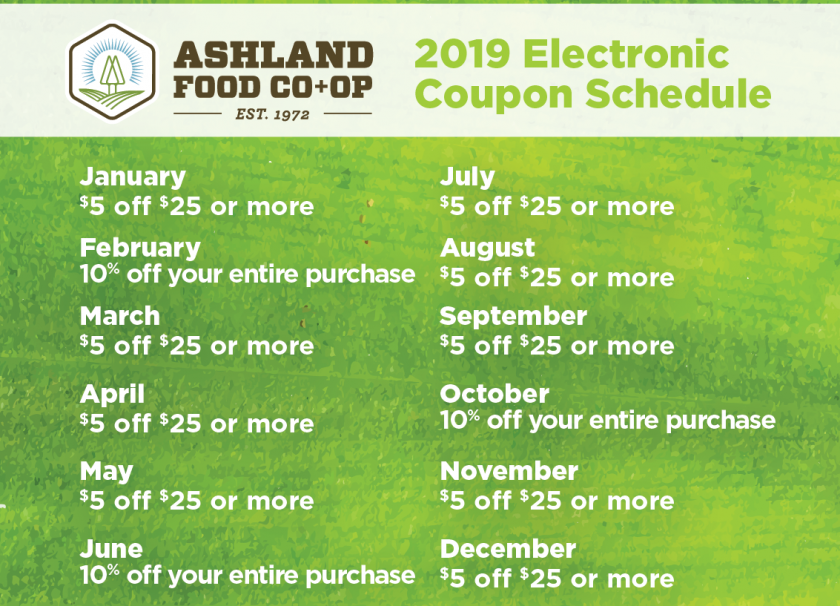
2019 Owner Coupon / Benefits Calendar
Hey Co-op owners - if you're wondering if it's a $5 off or 10% discount month... you can reference this calendar.
These benefits are available to all Co-op owners. If you're not an owner yet, you can sign up online!
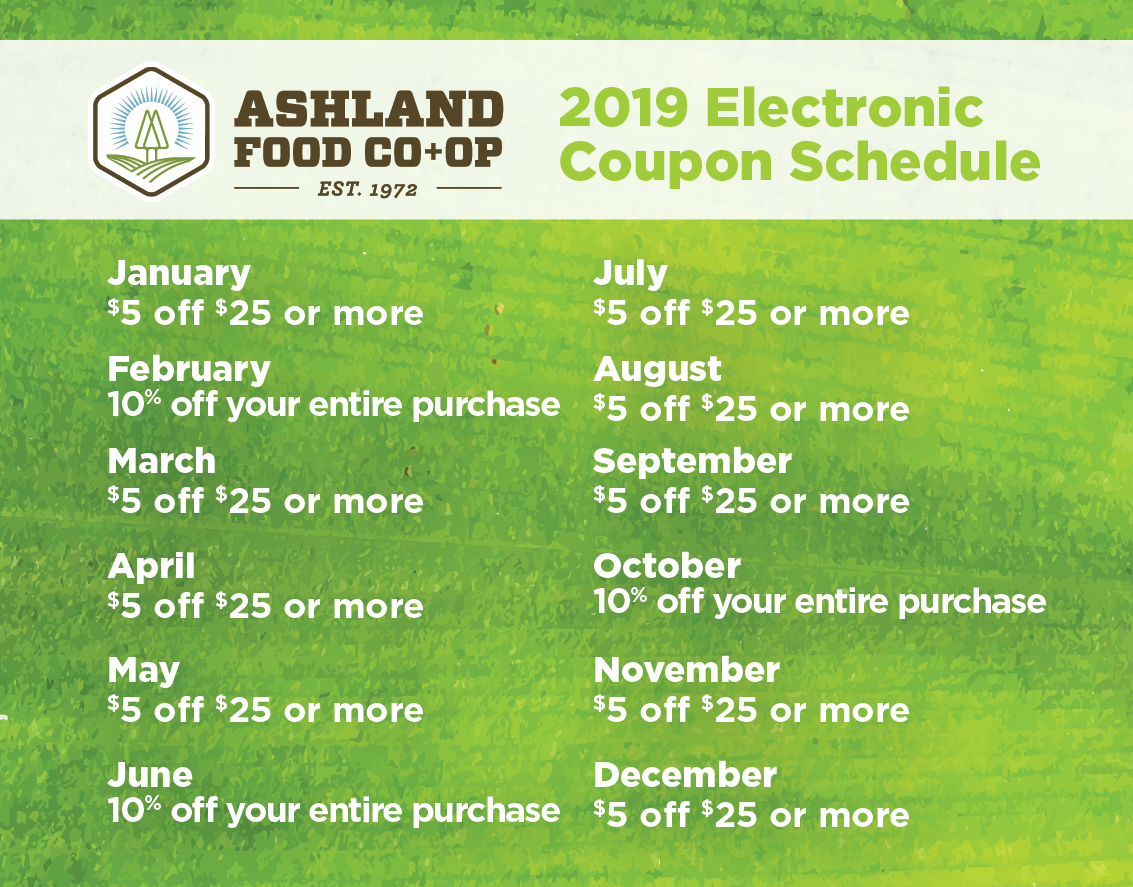
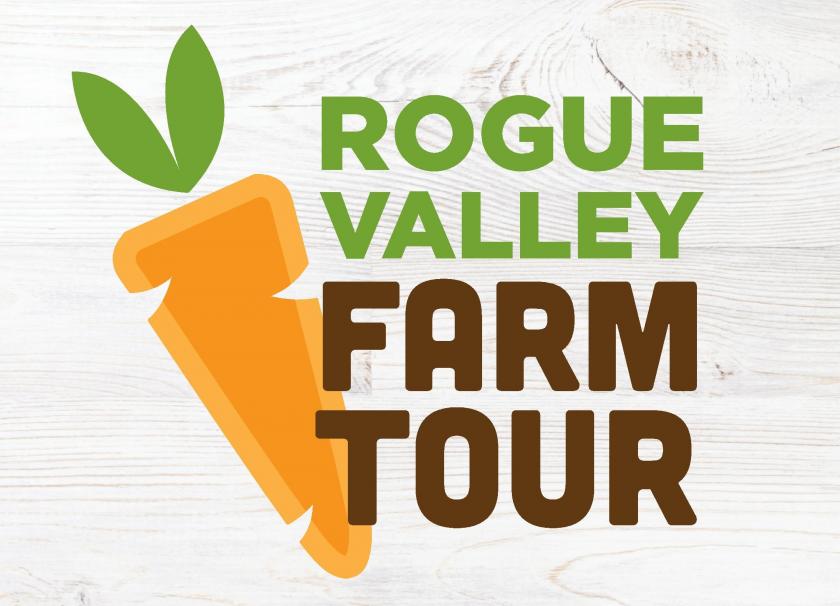
Farm Tour on the Shelves
The Farm Tour shines a spotlight on Southern Oregon - it represents the full range of products grown in the Rogue Valley. The Farm Tour isn't until July 14, but here's a list of tour activities for participating farms that are also on the shelves at the Ashland Food Co-op. Get an early taste of quality local goods!
